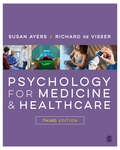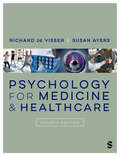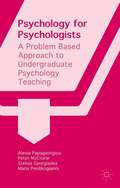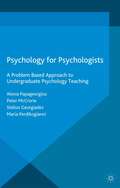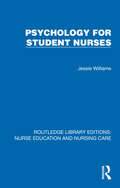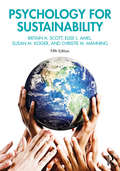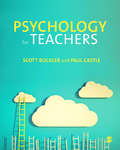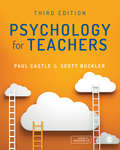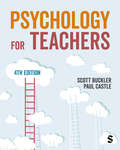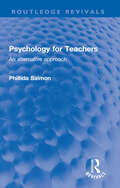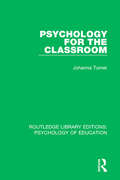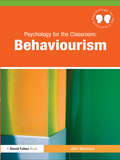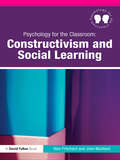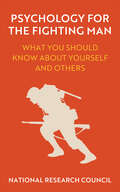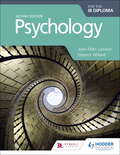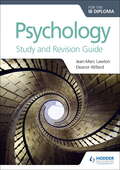- Table View
- List View
Psychology for Medicine and Healthcare
by Susan Ayers Richard de VisserAs our understanding of what constitutes ‘good health’ grows, so does our need to understand the psychological aspects of medicine and health, as well as the psychological interventions available in healthcare. This new edition of this bestselling textbook provides a comprehensive overview of the research, theory, application and current practices in the field, covering topics from epigenetics to social determinants of health and transdiagnostic approaches to mental health and everything in between. An essential read for all medicine and healthcare students, this text is now accompanied by a suite of online resources for all your learning needs.
Psychology for Medicine and Healthcare
by Susan Ayers Richard de VisserAs our understanding of what constitutes ‘good health’ grows, so does our need to understand the psychological aspects of medicine and health, as well as the psychological interventions available in healthcare. This new edition of this bestselling textbook provides a comprehensive overview of the research, theory, application and current practices in the field, covering topics from epigenetics to social determinants of health and transdiagnostic approaches to mental health and everything in between. An essential read for all medicine and healthcare students, this text is now accompanied by a suite of online resources for all your learning needs.
Psychology for Medicine and Healthcare
by Richard de Visser Susan AyersAs our understanding of what constitutes ‘good health’ grows, so does our need to understand the psychological aspects of medicine and health, as well as the psychological interventions available in healthcare. This bestselling textbook provides a comprehensive overview of research, theory, application, and current practices in the field. The new edition delves deeper into critical topics such as diversity and health inequalities, cultural influences on healthcare, the rise of digital healthcare solutions, and the well-being of healthcare practitioners. With updated case studies, research examples, and online resources, this essential text equips medical and healthcare students with the knowledge and tools to navigate the evolving landscape of health psychology. Richard de Visser is a Professor of Health Psychology at Brighton & Sussex Medical School. Susan Ayers is a Professor of Maternal and Child Health at City St George’s, University of London in the School of Health and Medical Sciences.
Psychology for Medicine and Healthcare
by Richard de Visser Susan AyersAs our understanding of what constitutes ‘good health’ grows, so does our need to understand the psychological aspects of medicine and health, as well as the psychological interventions available in healthcare. This bestselling textbook provides a comprehensive overview of research, theory, application, and current practices in the field. The new edition delves deeper into critical topics such as diversity and health inequalities, cultural influences on healthcare, the rise of digital healthcare solutions, and the well-being of healthcare practitioners. With updated case studies, research examples, and online resources, this essential text equips medical and healthcare students with the knowledge and tools to navigate the evolving landscape of health psychology. Richard de Visser is a Professor of Health Psychology at Brighton & Sussex Medical School. Susan Ayers is a Professor of Maternal and Child Health at City St George’s, University of London in the School of Health and Medical Sciences.
Psychology for Psychologists: A Problem Based Approach to Undergraduate Psychology Teaching
by Alexia Papageorgiou Peter McCrorie Stelios Georgiades Maria PerdikogianniThis book uses psychological theories and learning processes, such as Problem Based Learning (PBL), to provide a new approach for teaching psychology at an undergraduate level and prevent diminishing motivation. It creates a detailed example of a psychology degree using the PBL method and suggests how a week of the course could be planned.
Psychology for Psychologists: A Problem Based Approach to Undergraduate Psychology Teaching
by Alexia Papageorgiou Peter McCrorie Stelios Georgiades Maria PerdikogianniThis book uses psychological theories and learning processes, such as Problem Based Learning (PBL), to provide a new approach for teaching psychology at an undergraduate level and prevent diminishing motivation. It creates a detailed example of a psychology degree using the PBL method and suggests how a week of the course could be planned.
Psychology for Student Nurses (Routledge Library Editions: Nurse Education and Nursing Care)
by Jessie WilliamsOriginally published in 1954 and as a second edition in 1957, this book provides a survey of the main psychological principles necessary to nurses in their work. As well as being a textbook for nurses in training, it was written in such a way as to be of value to qualified nurses as well. The author drew widely on her experience as psychologist in London Teaching Hospitals including Guys, Great Ormond Street and University College Hospital, and as a lecturer to nurses in training. She illustrates her theme with many practical examples drawn from hospital experience. This is a careful and scientific study of psychology applied to nursing which is readable and avoids the use of unnecessary technical terms.
Psychology for Sustainability
by Susan M. Koger Elise L. Amel Britain A. Scott Christie M. ManningPsychology for Sustainability applies psychological science to so-called environmental problems that manifest when human behavior disrupts and degrades natural systems. Drawing on environmental psychology, ecopsychology, conservation psychology, and related disciplines, the authors provide an extensive review of relevant theory and research in a lively and easy-to-read style. This edition represents a substantial revision and expansion spurred by a burgeoning body of research and by global ecological, political, and social developments. Particular attention is paid to environmental justice and collective action for systems change. More than one-third of the content is entirely new, and there are more than nine hundred new references. This edition also features a new full-color design and over two hundred full-color figures, tables, and photos. Timely topics include climate change, biodiversity loss, environmental racism, Indigenous perspectives, social media, and COVID-19 and other pandemics. Content retained from the previous edition has been updated throughout. The twelve chapters are organized into four parts: What on Earth Are We Doing includes a prologue on psychology as a sustainability science, followed by three chapters that provide an overview of the ecological crisis and its historical origins, and a vision for a sustainable future. Psychology for a Sustainable Future encompasses five chapters on research methods, theory, and findings pertinent to understanding and shifting unsustainable behavior. What’s Good for the Planet is Good for Us includes two chapters that address the reciprocal relationship between planetary and human health. Being the Change We Want to See introduces two new chapters to inspire readers to take what they have learned and apply it as changemakers in the world. The first is about collective action for systemic change. The second presents a positive psychology perspective on how to tackle the ecological crisis in a way that promotes wellbeing and resilience and is personally meaningful and fulfilling. Carefully tailored to the length of a standard college semester, Psychology for Sustainability is essential reading for courses on sustainability across disciplines. It will be invaluable to people outside academia as well, including policymakers, legislators, and those working on sustainable communities. The text is also supplemented with online resources for instructors.
Psychology for Sustainability: 4th Edition
by Susan M. Koger Elise L. Amel Britain A. Scott Christie M. ManningPsychology for Sustainability, 4th Edition -- known as Psychology of Environmental Problems: Psychology for Sustainability in its previous edition -- applies psychological theory and research to so-called "environmental" problems, which actually result from human behavior that degrades natural systems. This upbeat, user-friendly edition represents a dramatic reorganization and includes a substantial amount of new content that will be useful to students and faculty in a variety of disciplines--and to people outside of academia, as well. The literature reviewed throughout the text is up-to-date, and reflects the burgeoning efforts of many in the behavioral sciences who are working to create a more sustainable society. The 4th Edition is organized in four sections. The first section provides a foundation by familiarizing readers with the current ecological crisis and its historical origins, and by offering a vision for a sustainable future.The next five chapters present psychological research methods, theory, and findings pertinent to understanding, and changing, unsustainable behavior. The third section addresses the reciprocal relationship between planetary and human wellbeing and the final chapter encourages readers to take what they have learned and apply it to move behavior in a sustainable direction. The book concludes with a variety of theoretically and empirically grounded ideas for how to face this challenging task with positivity, wisdom, and enthusiasm. This textbook may be used as a primary or secondary textbook in a wide range of courses on Ecological Psychology, Environmental Science, Sustainability Sciences, Environmental Education, and Social Marketing. It also provides a valuable resource for professional audiences of policymakers, legislators, and those working on sustainable communities.
Psychology for Teachers
by Scott Buckler Paul CastleEvery child is an individual whose knowledge and understanding needs to be developed in ways that help them succeed. How do you manage this alongside the realities of the curriculum? How do you achieve this for a full classroom of expectant learners? Psychology for Teachers explains how psychology can be intelligently applied to the classroom to meet the needs of different learners. It encourages you to review your own practice to develop a personal teaching style, supported by research findings and an awareness of the factors underpinning high-quality teaching. Focusing on how an understanding of psychological theory can support effective teaching and learning this book contains case studies and tasks to make sure that you really understand how theory can be meaningfully applied in the classroom. Additional online materials The book is supported by a companion website including resources such as free journal articles, additional activities and links to relevant information. Scott Buckler is a Senior Lecturer and Paul Castle is a Chartered Psychologist, Health Care Professions Council-registered and Senior Lecturer. Both are based at the University of Worcester.
Psychology for Teachers
by Scott Buckler Paul CastlePsychology for Teachers explains how psychology can be intelligently applied to the classroom to meet the needs of different learners. It encourages teachers to review their own practice to develop a personal teaching style, supported by research findings and an awareness of the factors underpinning high-quality teaching. Focusing on how an understanding of psychological theory can support effective teaching and learning this book contains case studies and tasks to make sure that trainees really understand how theory can be meaningfully applied in the classroom. This new edition now comes with three brand new sections: Mental health, wellbeing & resilience Psychological skills Evidence-based teaching This book is relevant for anyone undertaking an Education Studies degree or doing Primary or Secondary teacher training - particularly for the professional studies teaching topics.
Psychology for Teachers
by Scott Buckler Paul CastlePsychology for Teachers explains how psychology can be intelligently applied to the classroom to meet the needs of different learners. It encourages teachers to review their own practice to develop a personal teaching style, supported by research findings and an awareness of the factors underpinning high-quality teaching. Focusing on how an understanding of psychological theory can support effective teaching and learning this book contains case studies and tasks to make sure that trainees really understand how theory can be meaningfully applied in the classroom. This new edition now comes with three brand new sections: Mental health, wellbeing & resilience Psychological skills Evidence-based teaching This book is relevant for anyone undertaking an Education Studies degree or doing Primary or Secondary teacher training - particularly for the professional studies teaching topics.
Psychology for Teachers
by Scott Buckler Paul CastleHow can ideas and concepts from psychology be applied smartly to the classroom to meet the needs of different learners? Supported by research and an awareness of the factors underpinning high-quality teaching, this book encourages teachers, and those training to teach, to examine their own methods in order to develop as confident, evidence-informed professionals. This third edition includes: · A new chapter on the psychology of elearning · A new discussion of applied cognitive theories in the classroom · The use of internationally friendly terminology throughout the book · Some streamlining of content to offer a more cohesive reading experience
Psychology for Teachers
by Scott Buckler Paul CastleHow can ideas and concepts from psychology be applied smartly to the classroom to meet the needs of different learners? Supported by research and an awareness of the factors underpinning high-quality teaching, this book encourages teachers, and those training to teach, to examine their own methods in order to develop as confident, evidence-informed professionals. This third edition includes: · A new chapter on the psychology of elearning · A new discussion of applied cognitive theories in the classroom · The use of internationally friendly terminology throughout the book · Some streamlining of content to offer a more cohesive reading experience
Psychology for Teachers
by Scott Buckler Paul CastleThis is an essential textbook for teachers and those training to teach on applying research from psychology to education. It offers practical advice on ‘what works’ in the classroom. Not only will you understand how to teach effectively but also why, with explanations deeply rooted in theory and practice. Brimming with references to popular culture and packed with a range of tips, tasks, case studies and critical points, this book will keep you informed and intrigued in equal measure. This fourth edition includes: Significant updates to content on cognitive psychology and educational neuroscience; neurodivergence and special educational needs; and supporting mental wellbeing. Condensed and reworked chapters with a stronger focus on practical application in the classroom. Classroom examples described in universal terms to support teachers anywhere in the world.
Psychology for Teachers
by Scott Buckler Paul CastleThis is an essential textbook for teachers and those training to teach on applying research from psychology to education. It offers practical advice on ‘what works’ in the classroom. Not only will you understand how to teach effectively but also why, with explanations deeply rooted in theory and practice. Brimming with references to popular culture and packed with a range of tips, tasks, case studies and critical points, this book will keep you informed and intrigued in equal measure. This fourth edition includes: Significant updates to content on cognitive psychology and educational neuroscience; neurodivergence and special educational needs; and supporting mental wellbeing. Condensed and reworked chapters with a stronger focus on practical application in the classroom. Classroom examples described in universal terms to support teachers anywhere in the world.
Psychology for Teachers: An alternative approach (Routledge Revivals)
by Phillida SalmonFirst published in 1988, Psychology for Teachers offers a new approach to the study of the psychology of education. In contrast to many traditional texts, in which measurement is overemphasized and the individual tends to disappear in generalizations, this accessible book stresses the importance of both the individual and the process of learning and considers all aspects of schooling from the viewpoint of the person- whether teacher or pupil. Phillida Salmon provides a profile of the learning classroom through detailed case studies and examples. Her thesis will find an immediate response with all those who work in education. Psychology for Teachers offers both to those in training and in the classroom, and to those who work with them, a new and helpful way of engaging with the challenge of education and invites them to consider from a fresh viewpoint, some critical issues in schooling.
Psychology for the Classroom (Routledge Library Editions: Psychology of Education)
by Johanna TurnerOriginally published in 1977, Psychology for the Classroom is offered as an aid to people who are learning themselves and helping other people to learn: that is, to parents, students and particularly to teachers. The activity of teaching, to be successful, requires the teacher to understand the behaviour of the learner as fully as possible. Some of the insights into human behaviour gained by psychologists may prove helpful to the teacher in complementing his or her experience and intuitive understanding, and it is with this in mind that the topics covered in this book have been selected. Section one deals with cognitive aspects, an understanding of which his essential since cognitive processes are the means by which individuals are able to make sense of their environment. Section two considers the social situation in which knowledge and understanding develop, i.e. the way in which social interaction affects learning. Section three focuses on the individual, stressing that academic achievement depends not only on hard work but is intimately related to an individual’s personal development and personality. The book will be valuable to psychology students, student teachers and teachers on in-service courses, for its coverage of relevant psychological research and the description of pertinent experiments and studies of the time. Its originality lies in the way in which it communicates the importance of teachers using psychology as a basis for forming hypotheses which they can test for themselves – not necessarily as researchers, but in a mood of personal exploration.
Psychology for the Classroom: Behaviourism
by John WoollardPsychology for the Classroom: Behaviourism describes and reflects upon the foundations of behaviourism and the proliferation of behaviourist techniques in common practice today. Through examples drawn from research, presentation of theory, description of pedagogy and illustration by vignette, the book informs teachers and allows them to modify their teaching in order to take account of what is now known about the way that carefully planned curriculum and appropriately reinforced behaviours lead to learning. There is a particular emphasis upon the role of the traditional principles of behaviourist learning theory and practice to contemporary issues and strategies in e-learning. The author has taken a broad sweep of what has been written and promoted to educators in the area of behaviourist theory and practice, and the result is an informative and potentially very useful guide which should be read by all of us who are interested in, or responsible for, planning and encouraging effective teaching and learning.
Psychology for the Classroom: Constructivism and Social Learning
by Alan Pritchard John WoollardPsychology for the Classroom: Constructivism and Social Learning provides a lively introduction to the much debated topics of talk and group collaboration in classrooms, and the development of interactive approaches to teaching. The authors provide a background to research in constructivist and social learning theory, offering a broad and practical analysis which focuses on contemporary issues and strategies, including the use of e-learning and multimedia. Throughout the book theory is linked with its practical implications for everyday teaching and learning and chapters incorporate: the history of constructivist and social learning theory and key thinkers pedagogical implications practical strategies for the classroom constructivist theory and e-learning. Case studies and vignettes demonstrating best practice are used throughout the text, illustrating how monitored collaboration between learners can result in an effective learning environment where targets are met. Essential reading for practising teachers and students, this book is a valuable guide for those looking to provide effective teaching and learning within a constructivist framework.
Psychology for the Fighting Man: What You Should Know About Yourself and Others
by National Research CouncilUnleash the power of the mind in the crucible of war! In the depths of World War II, a groundbreaking endeavor emerged to provide the average American soldier with an accessible glimpse into the realm empirically grounded, scientific psychology. This transformative work, crafted with precision, aimed to empower every soldier who delved into its pages, unveiling the secrets to comprehending and harnessing their own intricate human responses—the elusive weaponry that holds the key to triumph on the battlefield. Prepare to revolutionize your understanding and utilization of the most enigmatic "instrumentalities of war," the human mind.
Psychology for the IB Diploma Second edition
by Eleanor Willard Jean-Marc LawtonEverything you need to navigate the IB Diploma Psychology course; ensure full coverage of the syllabus with a comprehensive guide to all the concepts, theories and research into approaches to understanding behaviour, presented with a cross-cultural focus for global thinkers. · Develop critical analysis skills with critical thinking boxes to draw out methodological issues from studies, and the TOK feature to help you recognise debates and issues.· Apply new skills and knowledge to everyday life with examples and case studies. · Navigate your way seamlessly through the course with key studies and terms highlighted.· Assess your progress and learning with summaries at the end of each chapter.
Psychology for the IB Diploma Second edition
by Eleanor Willard Jean-Marc LawtonExam board: International BaccalaureateLevel: IB DiplomaSubject: PsychologyFirst teaching: September 2017First exams: Summer 2019Everything you need to navigate the IB Diploma Psychology course; ensure full coverage of the syllabus with a comprehensive guide to all the concepts, theories and research into approaches to understanding behaviour, presented with a cross-cultural focus for global thinkers. · Develop critical analysis skills with critical thinking boxes to draw out methodological issues from studies, and the TOK feature to help you recognise debates and issues.· Apply new skills and knowledge to everyday life with examples and case studies. · Navigate your way seamlessly through the course with key studies and terms highlighted.· Assess your progress and learning with summaries at the end of each chapter.
Psychology for the IB Diploma Study and Revision Guide
by Eleanor Willard Jean-Marc LawtonExam board: International BaccalaureateLevel: IB DiplomaSubject: PsychologyFirst teaching: September 2017First exams: Summer 2019Encourage students to achieve their best grade by simplifying and focussing exam preparation with full syllabus coverage, practical exam tips and practice questions. · Ensure thorough exam preparation with full coverage of the syllabus including concise revision notes and clear explanations of the requirements and topics. · Focus on related vocabulary with key terms highlighted for each topic/sub-topic.· Give examples of what is required to achieve the best grades with examiner advice and tips, including the common mistakes to avoid.· Reinforce understanding and consolidate learning and exam focus with Exam Practice Questions.
Psychology for the IB Diploma Study and Revision Guide
by Eleanor Willard Jean-Marc LawtonExam board: International BaccalaureateLevel: IB DiplomaSubject: PsychologyFirst teaching: September 2017First exams: Summer 2019Encourage students to achieve their best grade by simplifying and focussing exam preparation with full syllabus coverage, practical exam tips and practice questions. · Ensure thorough exam preparation with full coverage of the syllabus including concise revision notes and clear explanations of the requirements and topics. · Focus on related vocabulary with key terms highlighted for each topic/sub-topic.· Give examples of what is required to achieve the best grades with examiner advice and tips, including the common mistakes to avoid.· Reinforce understanding and consolidate learning and exam focus with Exam Practice Questions.
